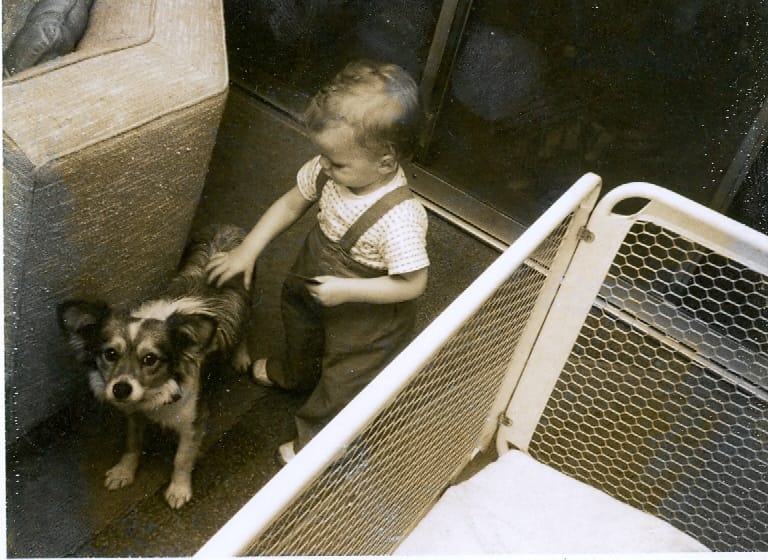Like it was yesterday Transparency for better living The dogs of OZ

I was chatting with my cousin about my planned week in Palm Springs. She said she "could use a few days in Palm Springs." That would be fun. In the way-way back machine, we were at our aunt's house in the desert sixty years ago. I was a toddler, and she was starting college. I asked her if she remembered it like yesterday. She said it seemed like eons ago. I, of course, don't recall that trip. I was busy with herding Kook the dog.

Man, I get what she means about it being eons ago. I tried to recall what it was like when I was starting college. A lot of life is happening between today and 40 years ago. This takes me right to the book I read this week—principles by Ray Dalio. He believes we need to evolve or fail/die. The key is to move quickly and honestly toward better versions of ourselves. I will get more into that later.
So, we went to the desert and cut it short. Our dog was not being a good guest of the resident dog. We had to keep switching them out like a little OZ prison cell block. I would let one out the back door while my husband let the outside one in from another door. Then, they would stare at each other through the glass window, wagging tails. For future reference, there will be no double dog houses.
I was thinking about goals for next year. I am using Ali Abdallas's goal-setting program. In a previous year, I had a goal to outlive the dog. At the time, it was a big goal. I was wicked sick and jindo dogs live a really long time. The subarus of the pet world. This year, my new goal is to train the dog not to prey on other dogs, to do some new tricks, and to play with her more. It's the 10x version of my previous goal.
What am I reading this week?
Principles: Life & Work | Ray Dalio
I started reading this book and put it down. There is a big intro about his family and work life. It was not engaging. If I had it to do again, I would jump right to his chapter on the principles and go back to read the introduction. Someone suggested I finish it, and I am glad I did. While super dense, it is honest and well-researched. I started thinking of The Tipping Point by Malcolm Gladwell because Ray's work relationships are all based on honesty, thoughtfulness, and care—a real love-centered starting point for all his business transactions.
If you don't know who Ray Dalio is, it's because he works hard at being a private person. Ray Dalio is a successful investor, entrepreneur, and founder of Bridgewater Associates, one of the world's most significant hedge funds. He has shared his principles for success in his book "Principles: Life & Work." He emphasizes the importance of a thoughtful and systematic approach to decision-making, continuous learning, and maintaining a healthy, open-minded organizational culture. His principles are super dense from years of reflective practice.
I think of this work as a modern Marcus Aurelius. That is if Marcus had algorithms and a staff of computer programmers. Every principle has been tested and monitored for validity over decades of use.
Here is an outline of some of the fundamental principles espoused by Ray Dalio: Ray Dalio's principles are deeply rooted in his experiences and have been instrumental in his success as an investor and entrepreneur.
Embrace Radical Truth and Transparency:
Foster a culture of open communication. Encourage honesty and transparency in all interactions. Seek and welcome feedback to promote continuous improvement.
Cultivate a Culture of Meritocracy: Focus on ideas and merit rather than hierarchy. Promote an environment where the best ideas win, regardless of their source.
Evolving is life's most significant accomplishment and reward.
Recognize and Accept Reality:
Face harsh realities and challenges head-on. Avoid wishful thinking and acknowledge mistakes for learning.
Understand the Power of Principles: Develop a set of core principles to guide decision-making. Apply these principles consistently in personal and professional life.
Learn from Mistakes: View mistakes as opportunities for learning and improvement. Encourage a culture where people are unafraid to make mistakes in pursuing innovation.
Foster Independent Thinking: Encourage diverse perspectives and independent thinking. Value thoughtful disagreement as a means to better decision-making.
Prioritize and Systematize: Establish clear priorities and focus on what matters most. Develop systems and processes to achieve goals effectively.
Evolve through Iterative Learning: Continuously learn and iterate on processes and strategies. Embrace a mindset of constant improvement. Evolution drives everything.
Maintain a Healthy Work-Life Balance: Recognize the importance of balance in personal and professional life.
Prioritize well-being and avoid burnout.
Stay open to new ideas and different perspectives.
Welcome criticism and diverse viewpoints as opportunities for growth.
Develop and use algorithms to make better decisions.
Systematize decision-making processes for consistency and efficiency.
Recognize the importance of distinguishing between decisions that have a significant impact and those that are less critical.
Foster collaboration and involve relevant stakeholders in decision-making processes.
Strive to create an environment where the best ideas prevail.
Encourage and reward those who contribute valuable insights.
Assess and manage risks effectively while considering potential rewards.
Make decisions with a clear understanding of the associated risks.
